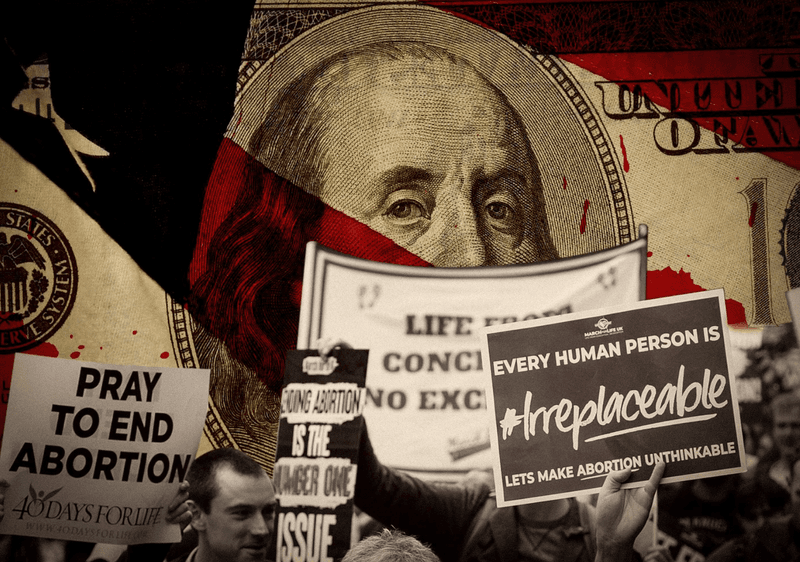Conservative MPs, hard-right media personalities, and US-backed Christian anti-abortion charities are working to spread their anti-abortion agenda ahead of a parliamentary debate on legislation that would stop women being imprisoned for terminating a pregnancy after 24 weeks.
Emboldened by their success in the United States with the Dobbs decision – the 2022 Supreme Court decision that overturned the right to safe and legal abortion in the US – groups such as the Alliance Defending Freedom and the Edmund Burke Foundation are now seeking to rollback progress on reproductive rights around the world.
Their campaigns in the UK are based on strategies honed and perfected in the US. They use language shaped over decades to seed anti-abortion falsehoods that begin on social media before becoming talking points on conservative-friendly TV stations modelled on right-wing US news channels and far-right podcasts. Crucially, those behind the campaigns also invest millions of dollars to push their agenda in the UK.
“As if the US anti-abortion movement didn’t already have sufficient momentum, the Dobbs’ decision turbo-charged their motivation and reach,” Gillian Kane, the director of policy and advocacy research at pro-abortion non-governmental organisation Ipas, told openDemocracy.
“There are veteran organisations continuing their line of work, but also traditionally domestic-focused groups… see an opportunity to dip their toes in these crowded international waters.”
In the UK, Labour MP Stella Creasy being viciously attacked on social media for backing an amendment to the Criminal Justice Bill that would end criminal sanctions for late-term abortions. These attacks were not started by a far-right activist or even an anti-abortion campaigner – but by her fellow MP Neil O’Brien, a former junior health minister in the Conservative Party-led government.
O’Brien claimed Creasy was “arguing for people to be able to kill a baby before the day it is due to be born”, branding the amendment “an incredibly extreme and bad proposal”. Contrary to his allegation, the legislation would not increase the 24-week limit in which abortions must be carried out. Rather, it would mean women who self-administer late-term abortions will not be imprisoned, after Carla Foster, a mother-of-three from Staffordshire, was jailed last year for illegally procuring her own abortion at around 33 weeks pregnant.
“On principle, we shouldn’t send women to prison for decisions they make about their own bodies,” said Louise McCudden, the UK head of external affairs at MSI Reproductive Choices, an NGO providing contraception and safe abortion services. “However, the solution has to be about more than prison and sentencing. We need to remove women who end their own pregnancies from criminal law altogether. That can be done without making any changes to the way abortion care is regulated or provided.”
O’Brien’s message was provably wrong – but it was still shared by five of his Conservative colleagues. Soon, hard-right broadcasters began making similarly incendiary posts about the amendment, with GB News’ Darren Grimes and TalkTV’s Isabel Oakeshott branding Creasy’s proposal “infanticide” and “butchery” respectively.
On social media, posts targeting Creasy started to quote far-right conspiracy theories and descended into misogyny and transphobia. It is no coincidence that such rhetoric directly echoes the far-right propaganda that led the US Supreme Court to overturn Roe vs Wade – openDemocracy has found that many of those making false claims about the amendment have links to the US anti-abortion movement, which sees an opportunity to make reproductive rights a new frontline of the UK’s culture wars.
“Abortion isn’t divisive in this country like it is in the US,” said McCudden “Ninety percent of people [in Britain] are pro-choice, and many people are frankly shocked to discover that abortion sits within criminal law at all. That said, there’s a small but very vocal minority which does seem to be getting more aggressive.
“There has been a worrying trend towards greater policing of women’s reproductive choices, with women’s bodies implicitly treated as national resource, especially in policy debates about the ageing population.”
Funded by US cash
The campaign against the UK amendment is reminiscent of the ‘partial-birth abortion’ propaganda successfully deployed by the US-anti-abortion movement since the mid-1990s.
The term, which refers to late-stage abortions, is designed to make people think not of a fetus but “of a young child”, as conservative Robert Arnakis explained in 2017 at an event hosted by the anti-abortion, anti-LGBTQ+ think tank, Family Research Council.
Such is its effectiveness, according to the Family Research Council’s president, Tony Perkins, that Donald Trump’s 2016 presidential election win can be traced back to the moment he referred to “partial birth abortions” during a candidate debate in Las Vegas.
So-called ‘partial birth abortions’ had been banned nationwide in the US by 2003. When that ban was challenged by Planned Parenthood in 2007, a Christian legal charity successfully argued it was constitutional all the way up to the Supreme Court. That charity was Alliance Defending Freedom, which would go on to fund the lawyer who won a fight to implement an abortion ban in Texas in 2021 and was influential in the Dobbs ruling that revoked Roe vs Wade.
But the ADF, which was founded in 1993, never intended to limit its influence over sexual and reproductive rights to the US. It has spent more than $31m on foreign activities since 2015, of which $27m has gone to Europe.
The charity is now splashing more cash in the region than ever before; in 2015, its European spend was $1.4m – by 2022 that had risen to $5.2m. While US organisations must declare who they fund at home, for foreign spending they only need to name the region their money is going to. This means it is impossible to parse the details of where exactly ADF’s dollars flow overseas – though tax returns reveal much of it goes to its own international branches.
The UK’s ADF branch, for example, has received more than £2m from its parent company since its first tax return in 2017. This has been spent on legal support for anti-abortion and anti-LGBTQ+ protesters and societies, as well as on growing its political influence in the UK – more than doubling its expenditure from £370,000 in 2018 to £770,000 today.
ADF UK’s communications lead, Lois McLatchie-Miller, was among those amplifying opposition to Creasy’s amendment. The day after she tweeted Creasy’s plans were “barbaric”, she appeared on the far-right podcast Hearts of Oak, which claims to “bridge the transatlantic and cultural gap between the UK and the USA” and has platformed conspiracist voices.
British anti-abortion groups have also increased their spending and activity in recent years. Right to Life UK, an anti-abortion charity with close ties to numerous UK MPs, spent £705,000 last year, up from £200,000 five years earlier. And the extremist anti-abortion group Centre for Bio-Ethical Research UK – which in 2019 erected a billboard featuring graphic abortion imagery outside Creasy’s office – is now targeting her constituency with leaflets and “education displays”. Although the group’s small size means it does not have to report full accounts, its staff numbers have risen from four in 2017 to 12 today, suggesting an uptick in its spending.
US campaigns, UK MPs
Money alone won’t help global anti-abortion actors to push their agenda in the UK. As the posts on X reveal, they are being aided and legitimised by Conservative Party politicians, media channels such as GB News, and events such as the annual National Conservatism Conference.
In 2019, ADF International paid for flights and other travel expenses for anti-abortion MP Fiona Bruce to attend its youth conference – Areté Academy – in Vienna. The same year, she attempted to ban late-term abortions for specific fetal anomalies. Academy alumni have gone on to work at Bruce’s legal firm, and in September 2023, she took another donation to cover expenses from ADF International, this time worth £1,737.92.
In Westminster, ADF UK also “engages with the members of the All-Party Parliamentary Group on Freedom of Religion or Belief”. It featured alongside a host of anti-abortion and pro-Brexit MPs – including then-home secretary Suella Braverman, Jacob Rees-Mogg, Danny Kruger and Miriam Cates – on the line-up of last year’s National Conservatism Conference, which was held in London.
NatCon, as the conference is more commonly known, is run by the Washington DC-based Edmund Burke Foundation. The 2024 conference – which took place in Brussels this week – was marred by controversies after police shut down the event during a speech by British hard-right politician Nigel Farage, following an order from a local mayor who feared a threat to public order. A court later ruled the event could resume and the ADF – which was again present at the conference – is backing a legal challenge against the mayor’s order.
On the bill for this year’s event were Hungarian prime minister Viktor Orban and French presidential hopeful Eric Zemmour, as well as British politicians including Braverman and Cates. The latter made a name for herself at the 2023 event, when she echoed the Great Replacement conspiracy theory, saying: “There is one critical outcome that liberal individualism had failed to deliver and that is babies.” The white nationalist theory accuses Black and Brown migrants of ‘colonising’ white Europeans and blames white women’s “selfish individualism” for low birth rates.
Cates is now part of a number of MPs pushing anti-gender narratives, including attacks on trans rights, LGBTQ+ inclusive education, and abortion. Alongside Kruger, she is a co-chair of the New Conservatives, a group of Tory MPs that says it is fighting “a dangerous new culture that despises national sentiment…, welcomes mass migration, denigrates our nation’s history, and pursues a radical agenda on sex and gender which is directly harmful to children”.
The Legatum Institute – a British think tank that openDemocracy previously revealed receives funding from the foundation of US billionaire Charles Koch, who donates to an array of anti-abortion causes – gave £50,000 to the New Conservatives in December 2023.
Legatum is also behind the recently launched ARC Forum, where Cates and Kruger sit on the advisory board, and is a co-owner of GB News, a right-wing news channel that offers a platform to commentators promoting anti-gender disinformation and anti-trans and anti-drag conspiracies.
While GB News and its presenters and guests maintain a veneer of respectability, the anti-abortion disinformation they amplify is picked up by far-right social media accounts that espouse conspiracies such as the Great Replacement.
One such post attacked Creasy’s amendment and suggested that white women should be banned from having abortions, while black women should be encouraged to have them. Another, which came in reply to a post by Grimes warned the plan would mean “the native birth rate will further decline”.
Despite the growing volume of attacks, and the increased spending on attempts to reverse abortion rights, the UK has seen progress in liberalising reproductive healthcare in recent years. Parliament voted to decriminalise abortion in Northern Ireland in 2019, and women have been able to access telemedicine for abortion since the pandemic. MPs also voted to introduce buffer zones around clinics, although the law has yet to be implemented.
But such success is often met with increased backlash. While the attacks on Creasy’s amendments seem disparate, our analysis shows they are connected by a global anti-abortion movement funded by hard-right interests determined to shout louder and spend more to roll back women’s rights in the UK. Such forces have already succeeded in making trans rights part of their culture war. They want abortion to be next.
openDemocracy approached ADF UK, O’Brien, Cates, Bruce, Clarke-Smith, Grimes and the Legatum Institute for comment, including clarification on what they believe the sanction should be for women who terminate their pregnancy after 24 weeks. We received no reply.



